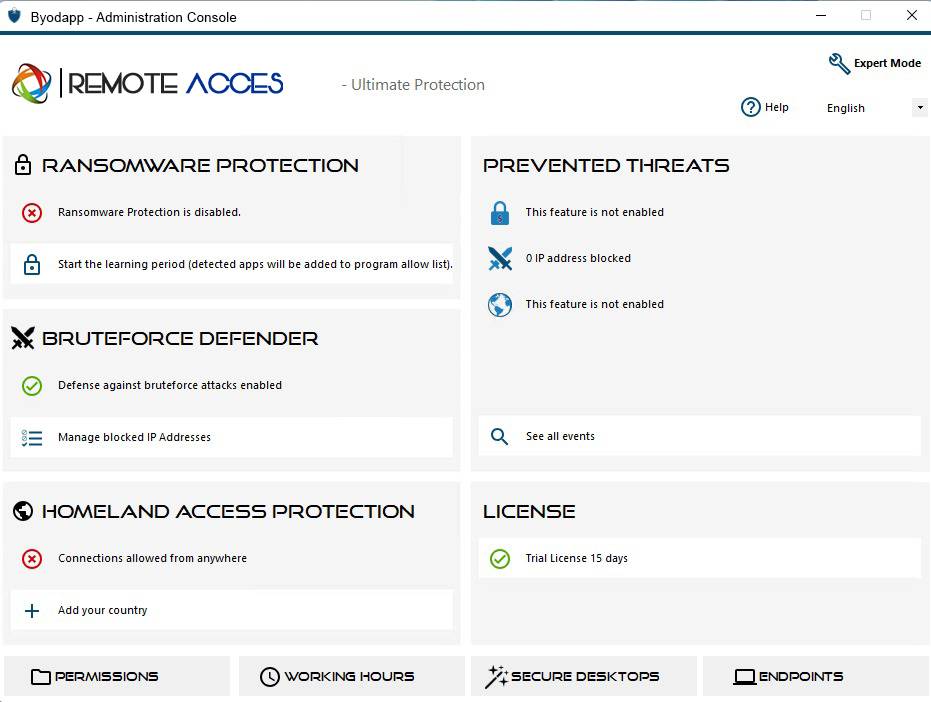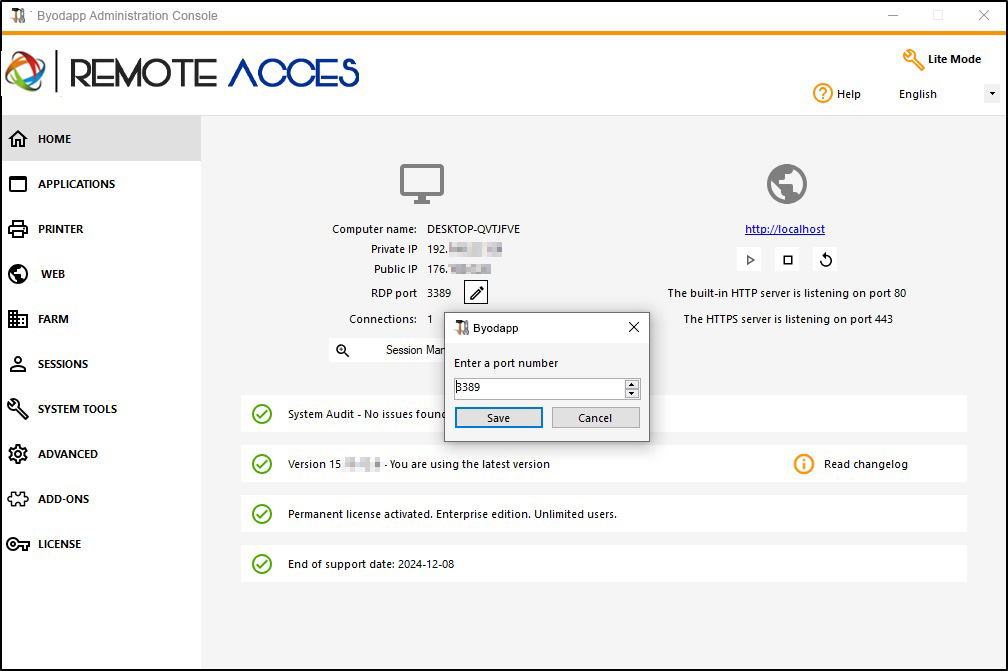BYODAPP Remote Access v17: Quickstart Guide
Prerequisites:
On the Server:
- OS: Microsoft Windows Versions 7 to 11 or Windows Server 2008R2 to 2022 with at least 2GB of RAM.
- BYODAPP does not support installation of Remote Access on Windows Home Editions.
- The operating system must be on the C: drive.
- Java Runtime Environment. If Java is not already installed, Remote Access will install OpenJDK during setup.
- If using a Windows Server OS, be sure that the TSE/RDS and TSE/RDSLicensing roles are not installed.
- Your Remote Access server must have a static private IP address.
- For External access, your server must have a static public IP address or dynamic DNS provider.
On the Client:
- OS: Microsoft Windows Versions 7 to 11 are fully supported.
- For MacOS you can use any Mac RDP client or the BYODAPP HTML5 client.
- For Linux you can use Rdesktop or the BYODAPP HTML5 client.
- Java Runtime Environment.
- A PDF reader (example: Foxit Reader or Acrobat DC)
For more detailed prerequisites please see the documentation
Note:
Starting with Remote Access Version 15, the Administration console has changed its look. A
Lite Mode and an Expert Mode have been introduced. Administrators
can toggle between the two interface styles by clicking the button in the upper-right corner of the
Admin Console.

Step 1 : Installation.
Note:
The trial version of Remote Access is the fully-featured Enterprise Edition. It is licensed for up
to 5 concurrent users for a period of 15 days.
Installing BYODAPP Remote Access is an easy process. Just download it from our web site, run the Setup-BYODAPP.exe program.
Files are decompressed and copied into:
- C:\Program Files\BYODAPP (32-bit systems)
- C:\Program Files(x86)\BYODAPP (64-bit systems).
Once the installation is complete the installer will ask you to reboot.
After the reboot, you will see 2 new icons on your Desktop:
![]()
![]()
See the documentation for full installation instructions.
Step 2 : Creating users.
After the reboot, the Remote Access Server is almost ready to go. Now we'll create users. Open the AdminTool to get started. Then go to the System Tools tab and click on "Users and Groups". This will take you to the Local Users and Groups window:
![]()

Each user must have a User Name AND a Password.
When creating users, be aware of the box labeled "User must change password at next logon". If you
don't want your users to change their password during the first login, uncheck this box and check
the "Password never expires" or "User cannot change password".
Step 3 : Select the most suitable client for your needs.
Remote Access is compatible with Windows Remote Desktop Protocol. Any user can connect locally or remotely with a standard Remote Desktop Connection client (mstsc.exe) or any RDP compatible client. To fully benefit from the advanced features in Remote Access (RemoteApp, Universal Printer…) you can use a generated client or the Remote Access Web Portal.
Remote Access is a very flexible solution and offers multiple ways to open a session:
- Classic Remote Desktop Connection (MSTSC.EXE).
- Portable BYODAPP RDP client which will display a windowed environment for your remote connection that you can minimize in the Windows taskbar.
- MS RemoteAPP client which will display application using the native MS RemoteApp.
- Windows client over the BYODAPP Web Portal.
- HTML5 client over the BYODAPP Web Portal.
These clients give the user the following experience:
With Remote Desktop Connection (mstsc.exe)
- Connection: The connection is a very standard one. The Universal Printer is not supported with this type of connection.
- Display: Users will see their session within a Remote Desktop window. This
desktop displays the content of the user’s desktop folder.
If the administrator has assigned specific applications with the AdminTool, only these applications will be displayed (no taskbar, no Desktop).
This is a unique BYODAPP solution, it empowers local and remote users to connect using one single
dedicated program.
It includes the connection program, the Universal Printing advanced feature, portability with high
level of security while keeping it very simple for the users.
For more information about using the BYODAPP Client Generator, see this documentation
The BYODAPP RemoteApp generated Client.
Remote applications will look and behave like a local application.
Instead of a classic Remote Desktop window, you will be free to switch between your local and remote
applications without having to minimize a Remote Desktop window.
For more information about these clients, see this
documentation.
Accessing your BYODAPP Remote Access server from a remote location
To access your Remote Access server from outside of your local network, you will have to create a port forwarding or port redirection rule of 3389/80/443 ports depending on your preferred connection method. You can change the RDP port in the Home tab:

The 80/443 ports can be changed in the Web Server tab:


Step 4 : Application Publishing and Application Control.
In the Remote Access AdminTool you can assign application to users or groups.
- If you assign one application to a user, they will only see this application.
- You also can assign them the BYODAPP Taskbar, the Floating Panel or the Application Panel to display multiple applications.
- You can also publish a full Remote Desktop.
Now available in Lite Mode from the home tab.


Or go to Expert Mode > Apps tab to add, edit, delete, and assign apps.

In this example, the administrator has decided that the user 'John' will get the BYODAPP Taskbar. See this documentation for more information.
Thank you for using BYODAPP Remote Access!